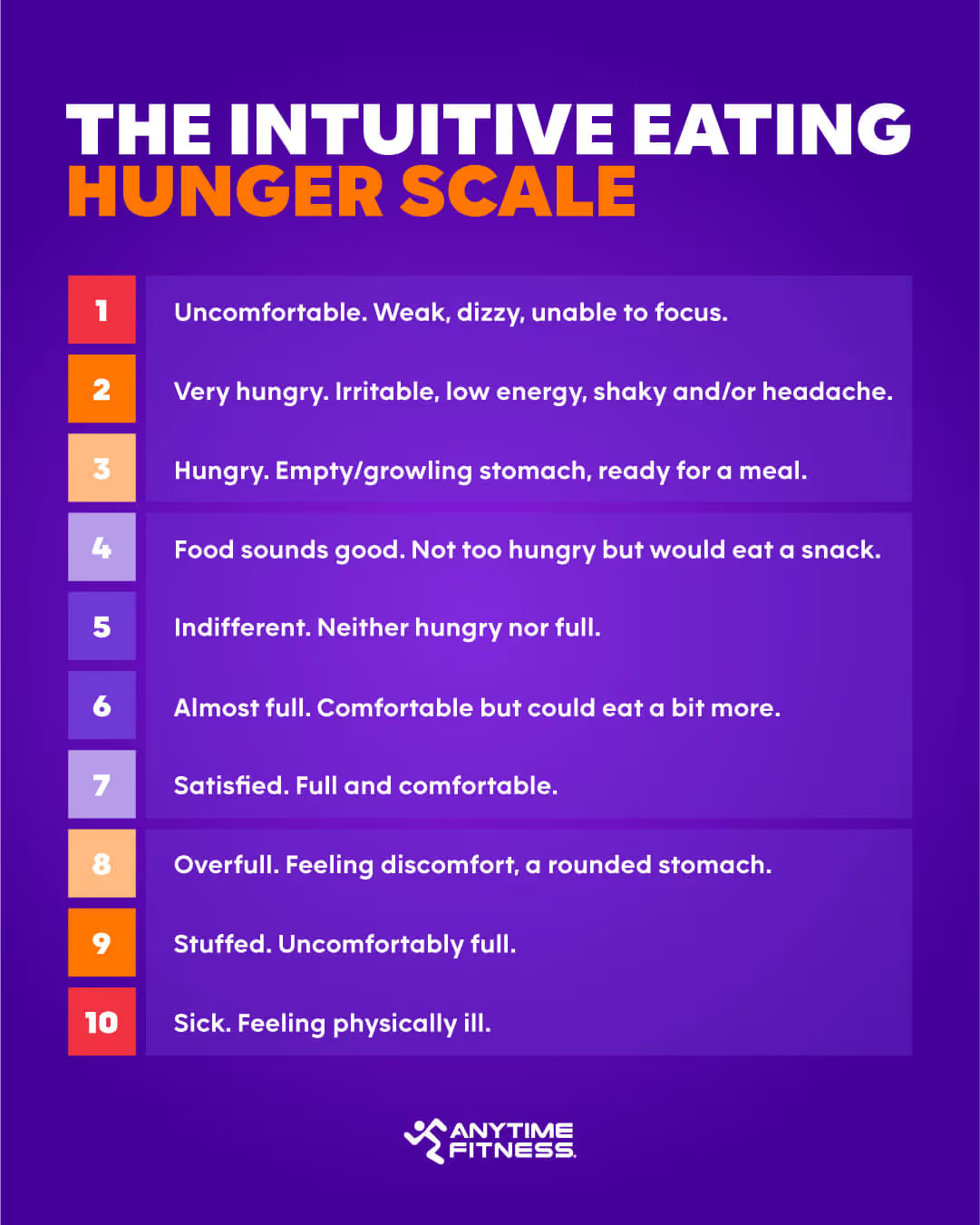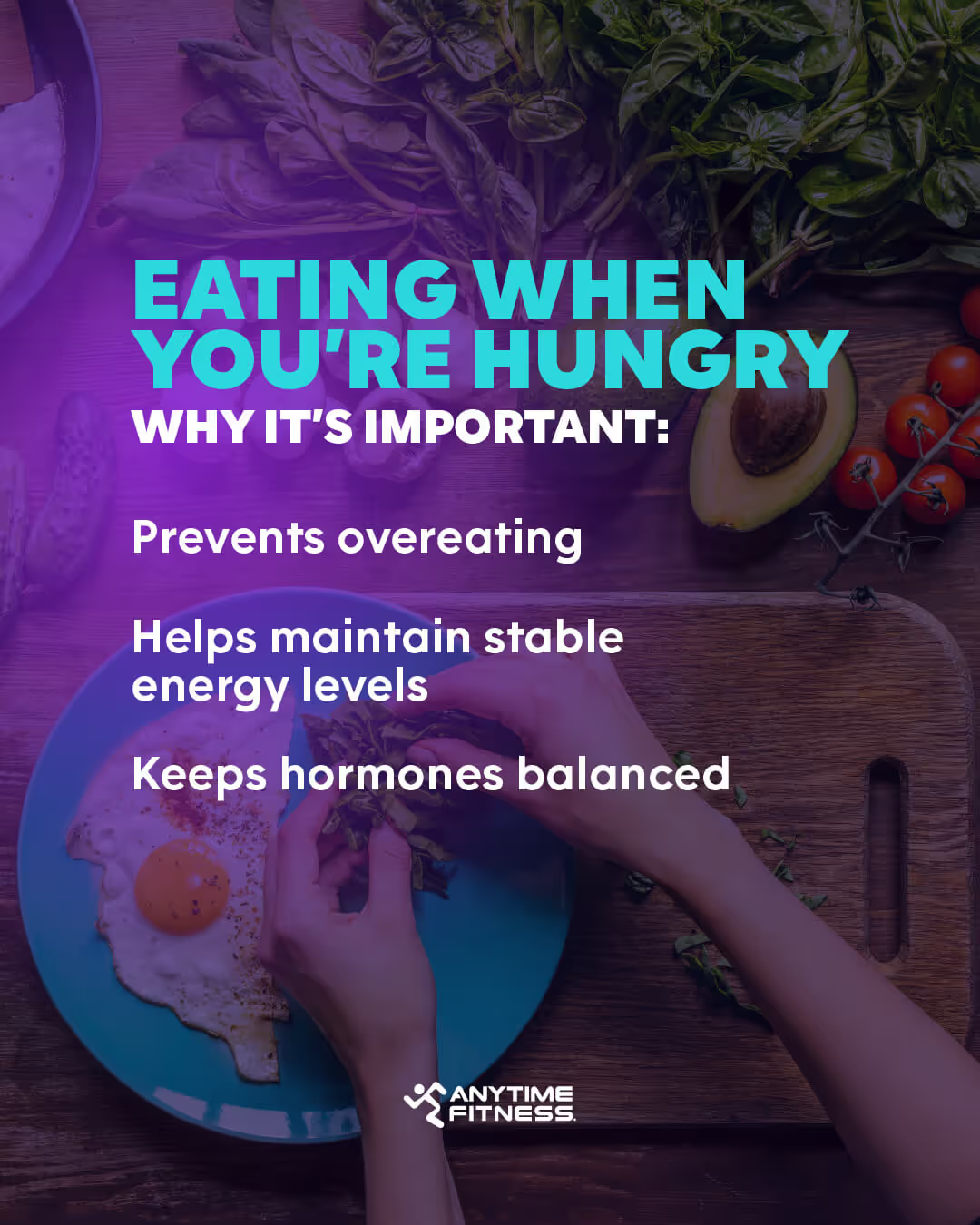Finding out which eating patterns work for you and your body can be a challenge, especially when trying to reach specific goals such as weight loss. While there is no shortage of meal plans and diets to choose from, intuitive eating takes a simplified approach: one that invites you to listen to your body’s cues (hunger and fullness) to guide your eating. In this article, we’ll answer questions like “what is intuitive eating?” and explore how to do it while ensuring you’re eating a balanced diet with proper nutrition on your personal health or weight loss journey. We’ll also dive into the benefits and results you can expect, and how this can complement your fitness goals. Let’s jump right in!
What is intuitive eating, exactly?
If you’re curious about intuitive eating vs. mindful eating, you’re already on the right track. Intuitive eating is a flexible, sustainable approach to nutrition that helps you reconnect with your body’s natural hunger. By focusing on nourishment, satisfaction, portion sizes that feel right, and self-trust, intuitive eating allows you to enjoy eating without guilt or restriction. Over time, this can foster a healthier relationship with food. Whether your goal is to feel more energized, reduce food preoccupation, or simply find joy in eating again, intuitive eating offers a balanced, long-term path to well-being — one that honors both your physical and mental health.

What are the benefits of intuitive eating?
Unlike traditional diets that tend to focus on external rules and metrics, intuitive eating encourages you to trust your body’s signals and prioritize internal cues. These can include hunger, satiety, and energy rather than body weight. Here are some physical, mental, and lifestyle benefits of intuitive eating:
Physical Benefits
- Improved Metabolism: Restrictive dieting can slow metabolism over time, but listening to hunger and fullness cues helps regulate energy balance naturally. Your body learns to function efficiently without the stress of calorie restriction.
- Better Digestion: Mindful eating and listening to your body's hunger signals allow for better digestion and nutrient absorption, reducing bloating, discomfort, and digestive distress as you eat in a more balanced way.
- Steady Energy Levels: By eating according to hunger rather than arbitrary rules, you’re more likely to consume a balance of carbohydrates, protein, and healthy fats, leading to stable blood sugar and consistent energy throughout the day.
- More Sustainable Weight Regulation: Instead of weight cycling (yo-yo dieting), intuitive eating helps your body settle at its natural, healthy weight without extreme fluctuations.
- Better Exercise Performance and Recovery: By fueling properly without restriction, you’ll have more energy for movement and improved recovery after workouts.
Mental and Emotional Benefits
- Freedom From Diet Culture: No more obsessing over calories or food rules. Intuitive eating expands your options and allows you to enjoy food without guilt so you can trust your body's wisdom.
- Reduced Food Obsession and Healthier Eating Patterns: Giving yourself permission to eat all foods decreases cravings and the binge-restrict cycle that can be seen with dieting. Over time, food can become less emotionally charged.
- Reduced Stress and Anxiety Around Food: Since there are no “off-limits” foods as an intuitive eater, it becomes less stressful and more about enjoyment and nourishment. This means you can mindfully choose menu items that appeal to you, rather than making certain menu items off-limits.
- Improved Body Image and Self-Esteem: Shifting the focus from weight loss to health and well-being helps you appreciate your body for what it can do, rather than just how it looks.
- Better Emotional Awareness and Coping Skills: Instead of turning to food for emotional comfort, intuitive eating encourages healthy coping strategies like journaling, movement, or deep breathing.
Lifestyle and Long-Term Benefits
- Easier Social Eating and Dining Out: No more stressing over menus or avoiding events because of diet rules — you can expand your options and enjoy meals with friends and family more easily.
- More Enjoyable and Sustainable Exercise: You’ll move your body because it feels good, not as punishment for what you ate. This leads to long-term consistency with movement.
- Lifelong Healthy Relationship with Food: Unlike diets that have an “end date,” intuitive eating is a sustainable, lifelong approach to eating that adapts to your changing needs.

What is the best way to become an intuitive eater?
Starting intuitive eating is all about learning to trust and listen to your body’s natural hunger cues. That said, transitioning to intuitive eating can feel unfamiliar. We’ve included a simple step-by-step guide below to help you get started.
How to start intuitive eating: 5 tips for success
- Understand your personal diet mentality.
Research shows that in some cases, chronic dieting can lead to weight cycling, increased cravings, and disordered eating patterns. Become aware of the diet fads and rules that influence your nutrition. Maybe it’s a caloric total you’ve heard to live by, food timing rules, or other food “rules”.
- Swap “all or nothing” thinking for eating in moderation.
Instead of avoiding certain foods at all costs, allow yourself to enjoy all foods in moderation. Slow down and truly taste your food. Eating without distractions and checking in with how you feel can help you recognize when you're satisfied rather than eating on autopilot.
- Find non-food ways to cope with emotions.
Food can be comforting, but if it’s your primary coping mechanism for stress, boredom, or sadness, it may not serve you long-term. Explore other tools like journaling, mindful movement, or deep breathing exercises.
- Honor your health with gentle nutrition.
Intuitive eating doesn’t mean ignoring nutrition. Instead, focus on balance — incorporating foods that make you feel energized and satisfied, while still allowing room for enjoyment. A mix of protein, fiber, and healthy fats can support stable energy levels and overall well-being as an intuitive eater.
- Tune into hunger and fullness cues.
Your body has built-in mechanisms to regulate hunger and satiety through hormones like ghrelin (which signals hunger) and leptin (which signals fullness). Pay attention to when you feel hungry and eat before reaching extreme hunger, which can lead to overeating.
Related: Why Am I Always Hungry and What Can I Do to Change That?
Why is it important to eat when hungry?
Hunger is your body’s natural signal that it needs fuel. Ignoring it can lead to a variety of physical, mental, and emotional consequences. Here’s why honoring your hunger is important:
- Prevents Overeating: Ignoring hunger can lead to extreme hunger later which makes it much more challenging to eat mindfully. You may crave high-calorie foods over nutrient-dense foods and overeat past fullness.
- Helps Maintain Stable Energy Levels: Going too long without eating can cause blood sugar to drop, leading to fatigue, dizziness, irritability (aka “hanger”), and difficulty concentrating.
- Keeps Hormones Balanced: Skipping meals can disrupt hunger hormones. Chronic food restriction can also affect hormones related to stress, sleep, and metabolism.

Stay balanced: Meet your nutritional needs with these tips
If you choose to try intuitive eating, it’s important to keep your nutritional goals in mind and practice balance. Here are some tips for success:
- Be Mindful of “Hunger Confusion”: If you’ve been dieting for a long time, it may be a bit difficult to recognize your body’s hunger and fullness signals which can lead to undereating or overeating. Use the hunger-fullness Scale (1 = ravenous, 10 = overly stuffed) to check in with your body before, during, and after meals.
- Avoid a “Hunger-Only” Diet: True intuitive eating considers energy needs, nutrition, and emotional well-being. Even if you don’t feel super hungry, make sure you’re eating meals with a balance of protein, fiber, and healthy fats to keep your energy stable.
- Don’t Ignore Nutrition: While intuitive eating removes strict food rules, nutrition is still essential. If you only eat processed, low-nutrient foods, you might lack key vitamins and minerals. Intuitive eating isn’t about perfection, but over time, your body will naturally crave a variety of nourishing foods. Aim for balanced meals that include:
- Protein (e.g., chicken, fish, tofu, eggs, beans)
- Healthy fats (e.g., avocado, nuts, olive oil)
- Fiber-rich carbs (e.g., whole grains, fruits, vegetables)
- Don’t Ignore Medical Conditions: If you have diabetes, PCOS, heart disease, or other health concerns, you may need to adjust intuitive eating to support your medical needs. Work with a dietitian or healthcare provider to integrate gentle nutrition while still honoring intuitive eating principles.
- Avoid Comparison and a “Doing It Right” Mentality: There’s no one-size-fits-all approach. Your journey with intuitive eating may look different from someone else’s, and that’s okay! Let go of the idea that you have to follow intuitive eating “perfectly” — it’s about flexibility, and determining what’s best for you.
How can intuitive eating support health and exercise goals?
Intuitive eating has benefits that extend beyond your nutritional goals. When done mindfully, it can also support your holistic goals and exercise plans. This starts by training you to listen closely to your body. Intuitive eating emphasizes tuning in to your body's hunger and fullness cues.
Similarly, it also encourages you to listen to your body's signals during exercise, helping you dial in fueling strategies. This approach also promotes eating based on hunger and nutritional needs rather than strict rules, helping you to fuel properly. This can ensure you have enough energy for your workouts without feeling deprived or overly full.
With consistency, intuitive eating can help you build a positive relationship with exercise where you’re focusing on how your body feels during exercise rather than just the calories burned. Intuitive eating can shift the focus from exercise solely as a means of weight control to one of enjoyment and overall well-being.

What to know about weight loss and intuitive eating
“Can you lose weight with intuitive eating?” is a common question. While intuitive eating can lead to weight loss in some cases, that isn’t always the primary focus. If your goal is to lose weight as an intuitive eater, keep in mind that it can lead to weight loss when a healthy relationship with food is established. It also can be an outcome of eating a more nutrient-dense diet.
A final word on intuitive eating
Now that we’ve answered “what is intuitive eating?” the next step is to decide whether it’s right for you! If intuitive eating is right for you and you choose to try it out, you’ll likely find it easier to listen to your body over time. Hunger and fullness cues can guide your nutritional choices, helping you eat foods and portions that support your body and health goals, such as weight loss. For one-on-one guidance on a nutrition plan that makes sense for you, schedule a fitness consultation and access more tips here.
Dive deeper into nutritional resources to help support the whole you. From recipes to easy protein hacks to a full guide to micronutrients, we have you covered!






%20(1)%20(1).avif)